Bakhmut symphony, January 2023. How the city continues to survive the war
Kyiv is the "new Berlin", Chernivtsi is a "little Vienna", Vylkove is the "Ukrainian Venice". Before 24 February the value of Ukrainian cities has often been articulated in relation to cities in Europe. This trend has persisted since the beginning of the full-scale war, but the reference points for comparisons have shifted.
Mariupol is now the "Ukrainian Aleppo". Bakhmut has been compared to Verdun, where the longest battle of WWI took place. Bakhmut has been 60% destroyed: six out of every 10 buildings have either suffered significant damage or have been completely destroyed.
The Armed Forces of Ukraine continue to hold the city, while Russian troops continue to press on. That is how it has been for the past six months. Despite the constant fighting, life in Bakhmut goes on.
Over 80,000 people were living in Bakhmut before Russia's full-scale invasion. Now only around 8,000 remain in the city, including 206 children, according to Bakmut Mayor Olkesii Reva's estimate from 13 January 2023. Invincibility centres serve hot meals, Starlink satellites provide Internet access, and a small market offers a selection of groceries just a couple of kilometres away from the trenches. [Invincibility centres are warm-up points offering Internet access, tea and coffee, and sometimes hot meals; thousands of such points have been established all over Ukrainian-controlled territory in autumn and winter 2022 - ed.]
Ukrainska Pravda reports on the two sides of life in Bakhmut: military and civilian.
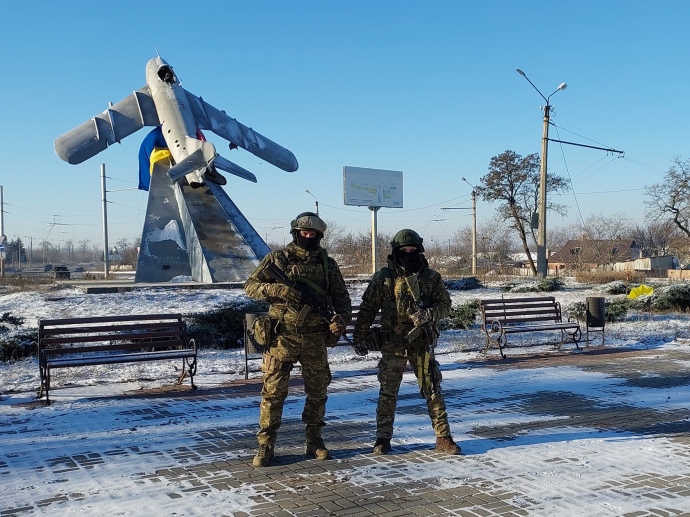 The aircraft monument is one of Bakhmut's key attractions; taking a picture in front of the monument has become a tradition for soldiers who have been deployed to BakhmutAll photos: Vadym Petrasiuk
The aircraft monument is one of Bakhmut's key attractions; taking a picture in front of the monument has become a tradition for soldiers who have been deployed to BakhmutAll photos: Vadym Petrasiuk
"The gun's as hot as hell"
I have talked to several soldiers defending Bakhmut. None of them agreed to divulge the details of the city's defence. This is to their credit: in war, careless talk costs lives, and not just the life of the person talking.
But they were not reticent, either. I patched together their partial disclosures, omissions, and bursts of emotions to create an account of how soldiers see Bakhmut through the sights of their guns. The account below has been patchworked from stories told by several Ukrainian soldiers deployed to Bakhmut.
*** "The Moskals [derogatory name for Russians - ed.] appear to be using their own troops as cannon fodder. They send their infantry to fight us, sometimes even without helmets or body armour.
They throw them right in. Our guys keep shooting at them, they collapse in droves, but there are always more of them coming. Why are they doing this?
The only more or less reasonable answer is that they are trying to tire us out. At first they send their most worthless people, pure cannon fodder, people they do not care about. We start to shoot at them: one round, two rounds, three, five...
Your gun starts to overheat, you'd really rather stop shooting for fear of heat-induced jams - if that happens, you're really screwed! But you can't help it, you resume shooting. They fall, they get up and they march on.
This drives you crazy. Your gun's out of ammunition and you have to crouch inside the trench, get out new packs of ammo, peel away the packaging and reload the gun. The ammo scatters in the mud, you're on edge, your fingers are cold.
Obviously you can no longer see what's happening on the battlefield. Meanwhile, new assault groups start to advance following in the steps of the Moskal trash that went before them. They get close enough to our trenches to throw grenades into them.
Our guys get killed or are forced to retreat. Then we're asked why we abandoned our positions! Why, oh why!
Because the gun's hot as hell - so hot it refuses to shoot! Read more: Defence of Soledar, potential encirclement and risks for Bakhmut. Interview with Oleksandr Pohrebyskyi, soldier of the 46th Brigade
Every now and again someone says that the Ukrainian infantry is not good at digging trenches, that our trenches are knee-deep. Maybe that's true in some places, but definitely not everywhere. Not everyone is the same.
The Moskals, meanwhile - yes, they can dig. Sometimes they even make a show of it: they stand tall, take off their shirts, pick up their shovels and dig like crazy, without even trying to hide. We don't fire at them, it's not worth it.
We've tried: we start shooting, reveal our location, and then get hit by their mortars and snipers... A knee-deep trench is bad because it won't save you. Firing at the Russians is bad because you'll get hit in return.
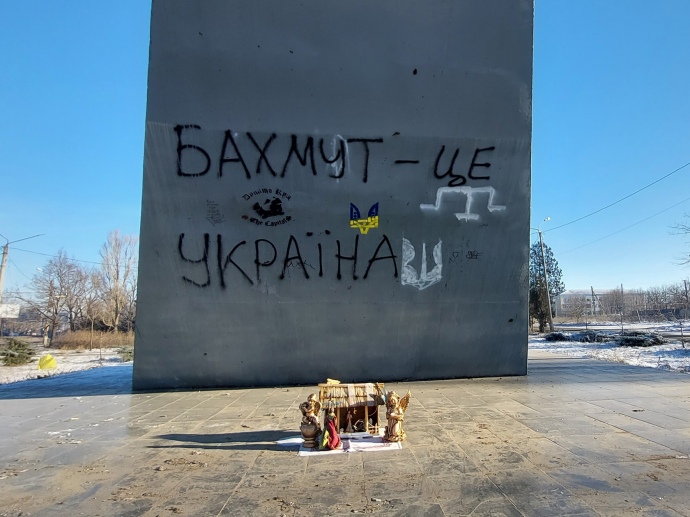
Graffiti on the plinth of the aircraft monument in Bakhmut reads "Bakhmut is Ukraine"
We are asked: "Why don't you dig deeper, why do you crouch in 40-centimetre deep trenches?" We're crouching because we could only dig that deep; any deeper and the ground gets so hard only a pick could bite into it. Digging that with a sapper shovel is like trying to scratch through concrete, all while lying flat on your stomach. If you get up - if you as much as rise to your knees - you get hit by mortar-launched bombs.
If you keep low, maybe you'll be spared, though maybe not. You never know what the best thing to do is in any given situation. In theory, we need more people on the ground: some keep watch while the others dig, then they swap.
But we don't have enough people; the Russians definitely outnumber us. Read more: "They say on TV that we are winning. If only they knew at what price." One day at a first-aid post in Bakhmut
The situation in and around Bakhmut has changed dramatically since 2 January. Before, we were fighting the Wagner Group and they're not the best soldiers. Their artillery fired haphazardly.
There's such a thing as a "random number generator". It was as if they had a "random attack generator", totally random artillery shelling. Then the Wagner Group was deployed to Soledar; they were replaced by professional paratroopers on the Bakhmut front.
The effectiveness of their artillery improved. Whenever our tank fired, it would get hit 5-6 times in response, and quite accurately. The Wagner Group fighters couldn't do that.
It got more dangerous. They also deployed additional 120-mm calibre mortars; before they mostly had the 80-mm calibre ones. The new ones are more powerful, they hit harder and can more easily destroy our trenches.
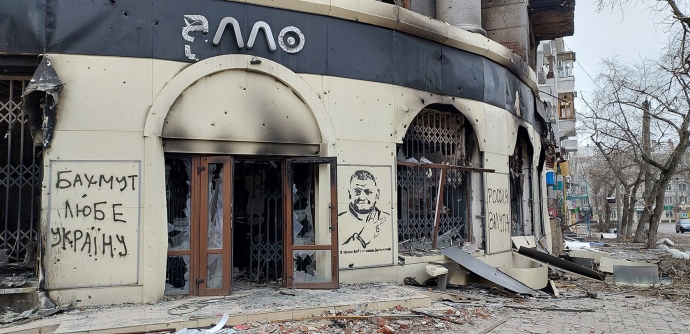 Graffiti on the wall of a destroyed building in the city centre reads "Bakhmut loves Ukraine".
Graffiti on the wall of a destroyed building in the city centre reads "Bakhmut loves Ukraine".
Everyone should know this about Bakhmut
Sometimes we're so close to the Russian positions that we can overhear the soldiers' conversations. Once we heard that they were preparing for an offensive; they were about to set out. It's weird and scary to hear: "You've got five minutes, set out on my command..."
It was clear from what they were saying that they got a shipment of ammunition minutes before the supposed offensive; they were told to load their guns. Can you imagine the lack of trust if they are only given ammo right before the battle! Maybe their own commanders are afraid of them - afraid to get shot by their subordinates?
Read more: Invincibility centre Bakhmut. What is happening at the most difficult axis of the front My first time out on the ground, I was so scared!
I was assigned an area I had to observe; I was peering into some bushes. In the evening they just looked like ordinary bushes. It's difficult to see things at night, everything appears black, so you have to rely on sounds.
In the morning, when everything grows grey, you start thinking that the bush really is a human, or some other suspicious object. You know that you're losing your grip on reality but you can't do anything about it. Then one of our guys suddenly starts firing, and I fire too, whether at that cursed bush or a Russian soldier.
Then the shooting suddenly stops. It turns out that someone pulled the trigger out of fright - their nerves were too frayed - and that's what set off the entire company, like barking dogs in a village. And each of us has just wasted a cartridge or even two of ammunition.
Firing at some bush, as in my case. I succumbed to panic like that once or twice, but then I would no longer get triggered so easily. Don't shoot if you're not sure what you're shooting at.
*** We had major losses, we didn't have enough people on the ground. A brigade deployed nearby sent us reinforcements; they hadn't been trained as infantry fighters though, but worked in communications, air defence and logistics...
We were grateful even for that. But they couldn't do it - we had to retreat and the Russians took over our positions. There was a lot of commotion, we had a brief window when we could launch a counterattack and push the Russians out - before they established a new front, brought in ammunition and figured out our new positions.
An assault unit was sent to join us, as well as an armoured personnel carrier, an infantry fighting vehicle and a tank. The infantry fighting vehicle rushed ahead, got hit by a Russian rocket-propelled grenade (RPG), and then rushed back so fast that the driver lost control and drove right into the tank. The tank rolled into a ditch and got stuck.
We asked for a second tank to get the first one out. Time was ticking. At last everyone took their positions.
We were listening to reports about the operational circumstances on our radios. One of our guys said that he thinks he saw a Russian RPG squad. A minute later our tank crew says: "We can't start the tank and won't be able to support the counterattack." Well, what can you say: war is war..."
In the car with the mayor
While battles are being fought on the eastern outskirts of Bakhmut, in the western part of the city people are going about their business; a bin lorry is collecting household waste, the market is bustling with trade, children are laughing and crying, kettles are boiling, mobile phones are charging...
I set out to Bakhmut together with the city's mayor, Oleksii Reva, in order to see this hybrid existence where war and peace intermingle. Bakhmut city council is currently working from the nearby Kostiantynivka, but the mayor comes to Bakhmut every day.
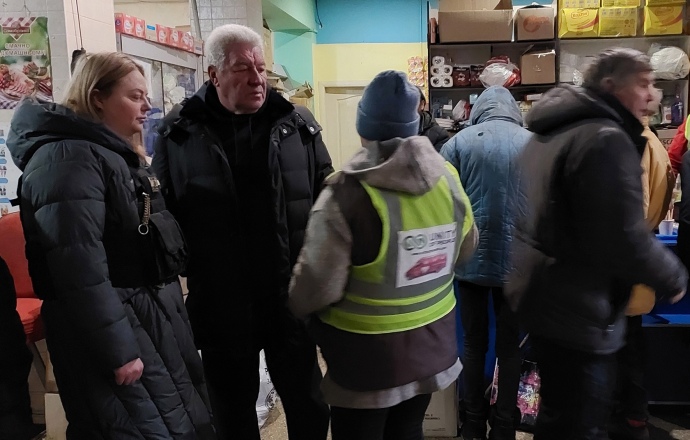 Bakhmut Mayor Oleksii Reva talks to volunteers
Bakhmut Mayor Oleksii Reva talks to volunteers
Reva might be one of the longest-serving mayors in Ukraine. He has been running the city for 33 years.
He has been elected seven times; he won his first election in March 1990, when Ukraine was still part of the USSR. He gives me a brief overview of local history while we are walking. Bakhmut is the oldest city in Donetsk Oblast, with the first mention dating back to 1571.
It was once a merchant town. Now it is the administrative centre of the Bakhmut territorial hromada, an administrative unit that comprises the city and 17 villages in its vicinity. "The war has left its mark on our villages as much as it has on Bakhmut itself," Oleksii Reva sighs. "Pokrovske, Klenove, Zaitseve, Opytne, Ivanivske...
They are all largely destroyed. Bakhmut itself is 60% destroyed; not a single business has survived. We were a thriving city before 2014.
Fifteen international businesses were based here: German, French, Belgian, Polish, Turkish, Swiss, working in furniture and glass manufacturing, pharmaceuticals, gypsum production, non-ferrous metals... We had five hryvnias of foreign investment for every hryvnia of our own budget. The European Bank for Reconstruction and Development has funded the renovation of most schools.
We were a student town with two universities and five colleges, formerly technical colleges. We built a new stadium. The railway station was renovated before Euro 2012.
We had 300 million hryvnias worth of modern medical equipment. Actually we still do, we managed to get it out of here in time. It's been used to set up a department at a hospital in Brovary; 120 medical staff from Bakhmut are currently working there.
The city employed over 2,000 municipal workers. We've purchased state-of-the-art bin lorries; Bakhmut used to be an exceptionally clean city. Russian missiles have destroyed all of this equipment.
We've been able to fix one of the bin lorries, and it's still working now. War is war, but we keep our city clean. We clear away the debris and rubble from shelling.
We collect household waste, we bring in bread and medicines. We're optimistic, we have faith in our own strength and in our Armed Forces. We will get rid of the Russians and rebuild our city."
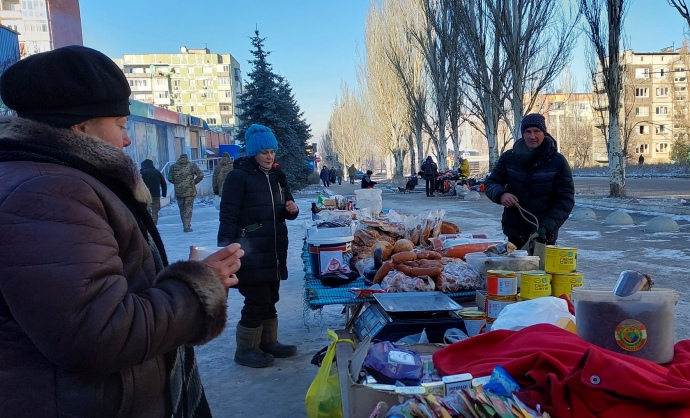 One of the very few functioning markets in Bakhmut
One of the very few functioning markets in Bakhmut
Railway station.
Hostel. Pharmacy
We enter the city. Oleksii Reva is listing all the buildings and facilities that have been destroyed:
- Industrial Technical College. A store whose owner I know, he's a good man. The stadium, we've put so much effort into it!
Artemivskyi Theatre, once the most elegant theatre building in all of Donetsk Oblast. A music school - a historic, old building, it must have been 200 years old. A pharmacy.
Another store. A social office - one of the best ones, all services under one roof. A kindergarten.
A rail station. A hostel. A pharmacy...
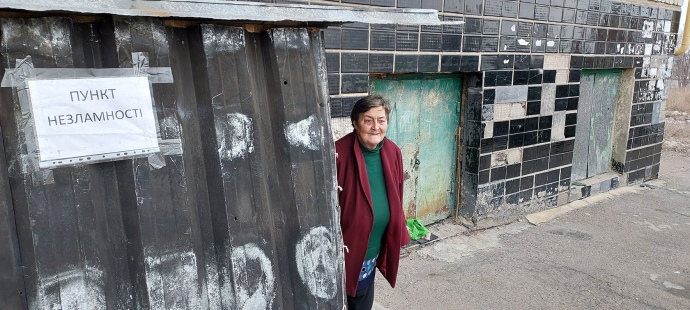
People turn their basements into bomb shelters.
These are also "invincibility centres" After a quick tour of the destroyed neighbourhoods, we find ourselves at a storage facility far removed from the line of contact. It's a humanitarian hub of sorts: various humanitarian cargos are delivered and sorted here, including coal, wood, generator fuel, food, and drinking water.
The mayor convenes a brief meeting to discuss six new powerful generators that have been received as humanitarian aid. To discuss pellets - a type of granulated fuel which has been distributed to people in need. A new shipment has arrived and it was time to think about its distribution.
To discuss potbelly stoves: demand for those has been met at last and only four were remaining in the warehouse. To discuss volunteers and their plans to set up a laundry room: the necessary equipment was being brought in, as well as a machine to bore a well needed to set the facility up. To discuss the previous day's shelling which killed 35-year-old Iryna, who worked on investment projects in the city council.
"Her house was struck, her mother-in-law and husband have been hospitalised and are recovering from surgery. Iryna is in the morgue. She was such a nice woman.
I need to take these papers for her burial," one of the Bakhmut city council employees said.
A 37-brick stove
We set out for one of Bakhmut's seven invincibility centres. Each provides hot meals to everyone who wants them, various components and chargers for mobile phones and torches, and a source of community, an opportunity for people to talk to one another. The first invincibility centre we visit has been nicknamed "the ring" because it has been set up in a former boxing gym.
There really is a boxing ring there; it is now covered in toys - it's been used as an improvised playground for the kids. There is only one child here though, Svitlanka, a six- or seven-year-old girl. She is hiding from me behind the toys.
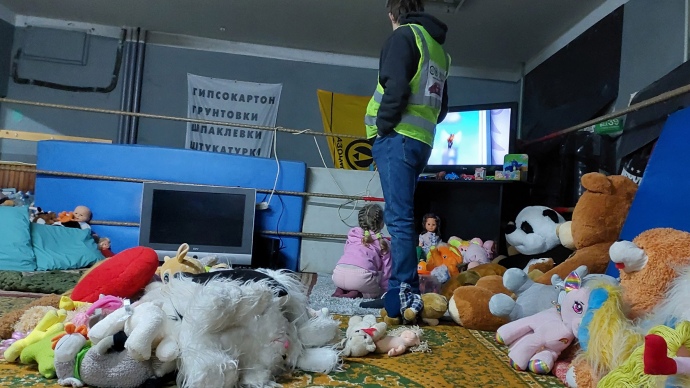
An invincibility centre in a former gym: boxing ring is now a kid's corner
Volunteers and municipal workers are doing their best to make the centre as comfortable for its visitors as possible. The long tables are decorated with tiny potted Christmas trees; it's still the winter holiday season, the trees will be removed after Epiphany. What are the visitors of this invincibility centre like?
They are mostly elderly. The war has made them look older. Men are unshaved and women look unkempt, too.
Worn jackets and coats that were fashionable 30 years ago. Four months in survival mode have made those people look like they do not have homes, even though they do; so many of the flats in Bakhmut are currently unoccupied.
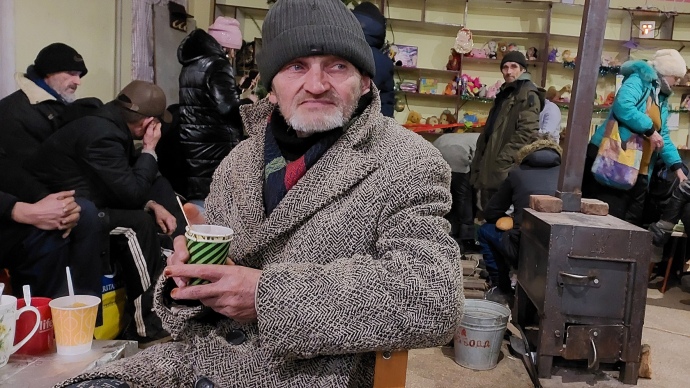 Invincibility centres offer hot tea and warmth
Invincibility centres offer hot tea and warmth
I join Oleksandr, a 55-year-old Bakhmut resident, as he warms his hands over a mug of tea, sipping carefully and waiting for his hot tea to cool down before he can take a big sip. He tells me about himself:
"Each day begins with me getting out from underneath the pillows and blankets I cover myself with when I sleep. I've been sleeping with my clothes on for the last several months, I just take my shoes off at night to air them out. Then I go to the invincibility centre to get warm, have some food, and talk to people.
Then I go back home. First I fix my windows. I have to do it several times a day because the glass has shattered long ago.
I've used all sorts of plywood, sticks and blankets to cover it all up... But this makeshift construction crumbles after every blast wave. When I wake up it's -8?C in the room.
By the time I've gone to have some food and come back, new shelling has left the windows wide open again and it's -12?C inside, the same as outside. This happens every single day. I try to make some tea.
My neighbours and I built a stove in our courtyard. It's a professionally made stove, it's called "37 bricks" - there's a video on the Internet, we used it to build the stove."
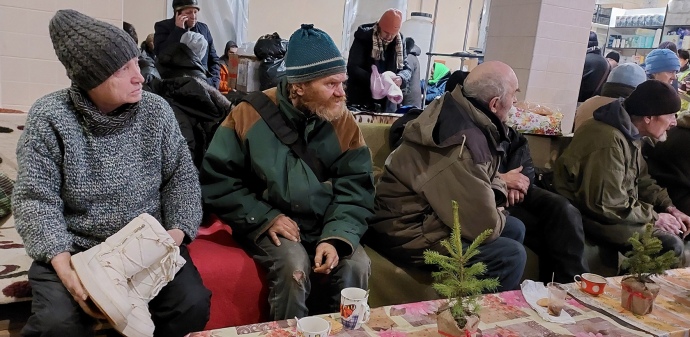
Invincibility centre: tables are decorated with tiny Christmas trees before Christmas and New Year I ask him why he doesn't evacuate.
"I'm not alone here. There are five people in my building [he lives in a five-storey apartment block with three separate entrances - ed.], five or seven in the next one over, and the next one, and the next one... There's a whole lot of us, we'll manage somehow!"
"Do you not have someone you could go to?" "What makes you think I don't? I have an uncle in Novovolynsk and an aunt near Kyiv.
But they haven't invited me to come, and I'm not going to ask them. My ex-wife said she'll help me if push comes to shove. But I'm telling you, there's a whole lot of us here, why would I go?
No good deed goes unpunished!"
Why do Bakhmut residents refuse to evacuate?
Around 10% of Bakhmut's residents have remained in the city despite everything happening there. Local government officials are begging them to leave - telling them about the dangers of staying, explaining the benefits of avoiding those dangers, explaining that there is a lot to be gained from evacuation, but... A special unit - called Bilyi Yanhol (White Angel) - has been created in the Bakhmut Police Department.
Officers from the White Angel unit search for people who want to evacuate and try to convince those who do not; they are also in charge of organising evacuation transport to help people get to safe settlements several dozen kilometres away from Bakhmut or to other parts of Ukraine.
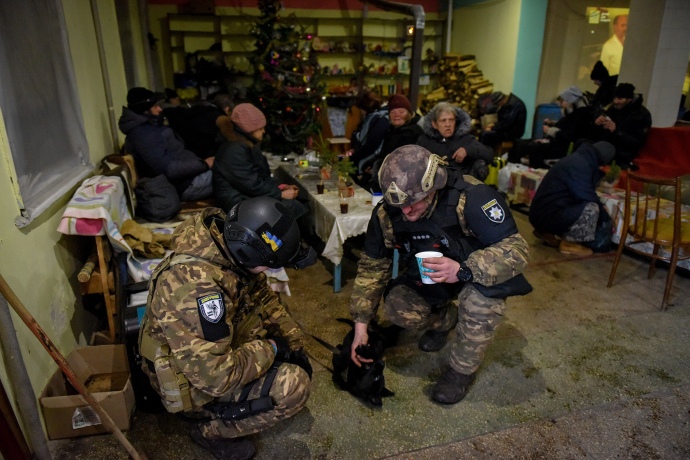
Officers from the White Angel unit at an invincibility centre Photo: Oleh Petrasiuk I talk to a White Angel officer and communications inspector at the Bakhmut Police Department, Pavlo Diachenko.
He thinks that the people who remain in Bakhmut can be categorised into three types. First, older people whose motto is "I was born here and I will die here too." Second, people who cannot leave their elderly relatives, who refuse to evacuate, alone.
Third, those whose fear of change prevents them from leaving, even if staying might cost them their lives. They tend to say "Well, it's not totally awful yet, we can live. When it gets really terrible..."
Oleksandr, whom I met earlier and who makes tea in his courtyard using a 37-brick stove, belongs to the latter group. "I ask people like that: how do you envision a situation that is 'really terrible'? How could it be more terrible than it is: there is no water, no power, no communications, no public transport; only shelling and the threat of being killed any moment.
What other hell are you waiting for?" Pavlo Diachenko wonders. The fear of leaving outweighs the fear of death for people in the third group. Most of them have never left Donetsk Oblast and if they have, they did so when they were much younger.
They are pathologically afraid of change. They think the war is terrible, just like everyone else does, but they don't think it is a strong enough reason for them to flee their home. "Once we spent ages trying to convince a 40-year-old woman and her 11-year-old daughter to evacuate," Pavlo Diachenko recalls. "We talked to them for several hours, offering every argument we could think of.
We told her: "Look at your daughter, her hair hasn't been washed for six months, it's so tangled no comb will take it, her skin is flaking off. What kind of fate are you condemning her to?" But the woman was adamant: no! They wouldn't leave.
We were desperate, we used up all our arguments: 'Well, sure, do what you think is best. But we're gonna come tomorrow in case you change your mind.' She said: 'Yes, yes, come tomorrow.' It was clear though that she wouldn't change her mind. She just wanted to get rid of us.
When we got there the next day we found out that the two of them left an hour earlier with an evacuation convoy. So we were able to get through to her." Pavlo also told me about how when it rained in December people went outside to collect water from the puddles with their shallow sweeping scoops in order to wash themselves and their underwear.
He told me about an elderly woman who gathered two dozen stray dogs in her courtyard and is refusing to leave because there is no one but her to look after them. Her house is in a private residential neighbourhood. Volunteers always stop by her house to drop off dog food.
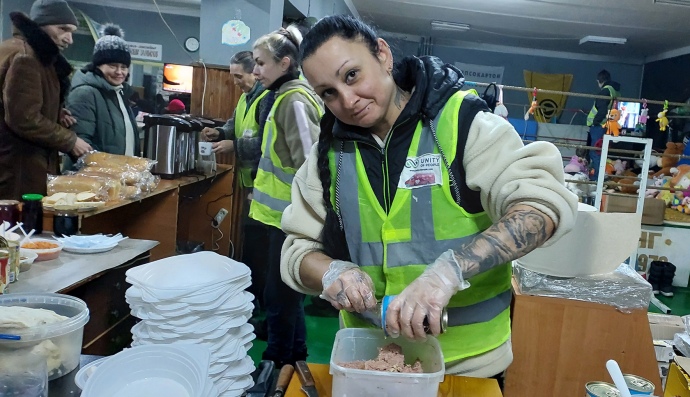
Anyone can get a hot meal at Bakhmut's invincibility centres
Pavlo also told me about a woman who kept moving from one temporary, makeshift home to another. "She asked us to help her leave Bakhmut. She said 'I was living in my apartment.
I went to get some food and when I got back, I no longer had an apartment. The house was hit by a missile. I moved to another building, and after another strike that flat was gone too - only broken brick and dust remained.
I moved to a third apartment, but it was destroyed too. Each time the missile strikes happened when I was away. Oh, please take me away from here, send me wherever you want, because I feel it in my heart that God will not give me another chance.' "
Before visiting Bakhmut, I knew that there were people - a lot of people - who are afraid of war, who flee it, who refuse to join the army and hide from military enlistment offices, because they fear dying more than anything else. Now I know that there are also people whose greatest fear is to leave their homes behind and flee the war. Turns out, this fear can be greater than the fear of dying.
*** Walking around Bakhmut these days, you can't help thinking that maybe a film crew is about to appear, that they're filming another apocalypse movie and that all the horrors around you are props made from plywood and foam. But that's not the case...
As we drive along Myr (Peace) Street, we are surrounded by ruins. Ukrainian soldiers tell us that we're 500 metres or at most a kilometre away from their frontline; the Russians are a bit farther. War is there, here is a destroyed Myr Street...
A municipal waste bin blocks our way, one of those wheelie bins. Shrapnel has pierced every inch of it so it looks like a colander. The rubbish that it coughed up in a blast wave spills over 30 square metres of the road: empty bottles, milk cartons, colourful wrappers, cardboard, a broken jar of frozen fruit juice.
We drive over the rubbish and I hear it squish under the car's wheels - there was no way around it. We keep going for a while, then stop again and get out. It's a clear and bright winter's day, -13?C, and the sun appears to be trying to cheer the city up; it's not really managing to though: there is no joy.
It's quiet for a while. Suddenly an autocannon's loud bass ruptures the silence: two rhythmic explosions, then another two. The Kalashnikov guns join in with their tenors; their short bursts add to the polyphonic effect.
Then the 120-millimetre mortars chime in like tympani: bommm! bommm!.. Bakhmut symphony, January 2023. Vadym Petrasiuk for Ukrainska Pravda
The writer is grateful to the soldiers from the 204th Separate Battalion of Kyiv's territorial defence forces for accompanying him and ensuring his security, and for their help with the story. Written by Vadym Petrasyuk Translated by Olya Loza
Edited by Susan McDonald